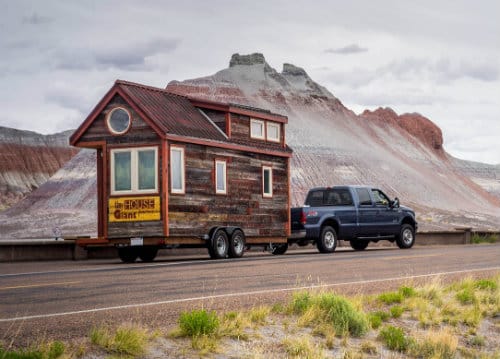If your housing costs have become more than you can afford or if you want to reduce your debts, you might be toying with the idea of downsizing from your existing home and moving into a smaller property.
After all, a bigger house typically means a bigger mortgage – right along with larger utility bills, and frequently, higher property taxes too.
That’s just one reason that people all around the country are trading in average-sized or even large-sized homes (remember the era of McMansions?) and moving instead into smaller homes, condos, townhomes or even apartments.
But to really cut costs, you may want to consider joining the “Tiny Home” movement.
That’s exactly what writer Kerri Fivecoat-Campbell, 52, and her 55-year-old husband, Dale, did.
Back in 2007, the couple traded in their 3-bedroom, 1,100-square-foot split ranch in the Kansas City, Kansas area for a 1-bedroom, 480-square foot cabin in rural Arkansas.
“We’re very, very glad we did it,” says Fivecoat-Campbell, ticking off a host of advantages, including “less maintenance and worry, at least $100 a month savings on utilities alone,” and the added benefit of becoming closer with her husband.
The experience prompted Fivecoat-Campbell to launch a blog and write a new book called Living Large in Our Little House: Thriving in 480 Square Feet with Six Dogs, a Husband and One Remote…and More Stories of How You Can, Too.
Although Fivecoat-Campbell’s house stands at just 480 square feet, tiny homes can be much smaller – or even a wee bit bigger.
There’s no standardized definition of what qualifies a home as “tiny” but these properties generally range from as miniscule as 80 square feet to anything less than 500 square feet.
A “small house” in the U.S. is typically considered between 500 and 1,000 square feet.
By comparison, the size of the average U.S. home has been trending upward in recent years, and is now about 2,700 square feet, according to the National Association of Home Builders.
The Pros and Cons of a Tiny Home
The so-called “Tiny Home Movement” means different things for different people.
Some homebuyers like the financial advantages of owning a tiny property. There’s less mortgage debt or often no housing debt at all. And reducing housing expenses lets people save for other goals, like retirement or a kid’s college education.
Others enjoy the “hassle free” factor of tiny homes, of not having to fix, maintain and clean as much, or not needing to furnish so many rooms.
And still other tiny home dwellers say their biggest joy is in the freedom they get – freedom from having so much stuff cluttering their homes; freedom from worrying about expensive housing bills; and even the freedom to pick up and travel whenever they want without being overly concerned about their homes while they are away.
In fact, some tiny homeowners actually travel with their homes, since some of these properties are mobile – and set on wheels.
Among the potential drawbacks, most tiny homes – by their very nature – don’t offer a spare bedroom for overnights guests. So if you have family or friends over for a visit, there probably won’t be a place for them to stay the night.
While many tiny home residents say they love their comfy quarters, there is a possibility, of course, of going stir crazy or feeling a bit too cramped. That can happen, though, in any almost any size home.
Lastly, there may be some financial or legal issues to address.
For example, you might have to get special approval from a city or town in order to build a tiny home, since many municipalities actually have a minimum building size, and a tiny home may not qualify.
Additionally, some banks may not offer mortgages on a tiny home, so you might need to come up with the cash to buy or build a tiny home outright.
Because tiny homes are so affordable – usually around $20,000 to $60,000, depending on location, size and other factors – most buyers do purchase or build these properties using cash, without a home loan, according to Fivecoat-Campbell.
Rental Income or a Housing Solution for Mom or Grandmom?
In recent years, especially in the wake of the Great Recession, more and more Americans have pondered the idea of living in a tiny home.
TV shows such as Tiny House Hunters and Tiny House Nation have made tiny homes even more popular, although not quite mainstream.
Even if living in a tiny home isn’t necessarily the right move for you – perhaps you have a growing family or you simply can’t picture yourself in such a small place – it may be a good option for your aging parents or grandparents.
Fivecoat-Campbell says one downsizing trend among retirees is the growth of so-called ADUs – accessory dwelling units.
“That’s where people put tiny houses in the backyard of their kids or grandkids homes, because older parents typically want to be close, but they still want their independence,” she says.
Tiny homes of these kinds are sometimes called Granny Pods.
If they’re not in use by grandparents or others, some owners of backyard tiny homes rent the units out and let them double as income-generators on sites like Airbnb.
What are your thoughts about living in a tiny home? Is this something you would ever consider? Why or why not?






